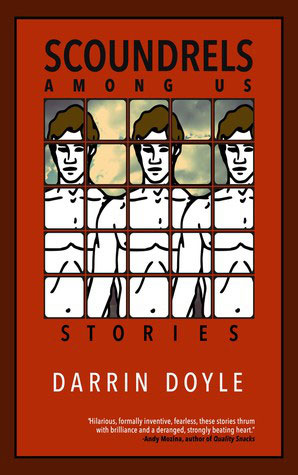Scoundrels Among Us
Scoundrels Among Us is definitely a man’s book. There aren’t too many female characters, and as much as I want to criticize it for that, I’d be lying if I said that the book never made me laugh. It’s full of terrible, dark humor, sometimes absurd—in the best possible way (think Daniil Kharms, or even Bob Kaufman). There are kids on fire, sitting in class with charred skin, a group of nine brothers that work at a Costco-esque department store, all pretending to be the same person, and a man, who’s dying alone in a forest, and his last wish is to have an extra-large Cajun Deluxe Meat Lovers pizza delivered to his exact, addressless location.
Scoundrels Among Us is definitely a man’s book. There aren’t too many female characters, and as much as I want to criticize it for that, I’d be lying if I said that the book never made me laugh. It’s full of terrible, dark humor, sometimes absurd—in the best possible way (think Daniil Kharms, or even Bob Kaufman). There are kids on fire, sitting in class with charred skin, a group of nine brothers that work at a Costco-esque department store, all pretending to be the same person, and a man, who’s dying alone in a forest, and his last wish is to have an extra-large Cajun Deluxe Meat Lovers pizza delivered to his exact, addressless location.
What I admire about this book is that no matter how “masculine” it might seem, it has these moments of absolute clarity where Doyle knows exactly what he’s saying, and more importantly, why he’s saying it. In the title story, “Scoundrels Among Us,” a mob of “men carved from boulders; shirtless, foul-mouthed, and bent on destruction” terrorizes a small town, and the leader of the group, calling himself C*nt—yes, the actual word, instead of this edited version—has dreams of becoming the mayor. Frightened, the actual mayor (whose name is Gayle) goes into this whole spiel on how, growing up, he hated his name. And then he talks about how the name C*nt is actually fitting for the terrorist, because it’s the filthiest word on Planet Earth, and it’s only used by “the most ignorant losers, the true insects of society.” The “m[a]n carved from boulders” falls into an existential crisis about his name and life choices. As horrifying as it sounds, “Scoundrels Among Us” is a tale of humility that, given, is quite uncomfortable, but in that blackness, there are millions of men and women, attempting to hide their deepest, most hated thoughts.
“Dangling Joe” is about a man who, one day, appears in the sky, just suspended there like a superhero, or an alien, or a mere mortal who lucked into the ability to float. It becomes the top story, the nail-biting thing that humankind is tuned into, and then over time, everyone slowly but surely forgets about Dangling Joe. It’s hilarious to think about, not only because of the what-if aspect, but the idea that what’s popular today, with a little time added to it, becomes nothing. Tribulations and spurts of happiness eventually fade into the background of this moment. It’s quite sad to think about; the whole collection is sad, really, but sad in the bittersweet way that marriage or having a child is.
Scattered throughout the book are these “Sessions” that read as therapy, Q&A back-and-forths that make one wonder what defines “insanity.” All the questions are stock, but the answers are those of a maniac, a maniac who knows much more than the average person. Or rather, a maniac who knows just as much as everyone else but isn’t hesitant to speak his mind. For example:
Q: If you had three wishes, what would they be?
A: The first would be the ability to fluently speak any language on earth. The second wish would be that nobody would ever understand a word I said, no matter what I said, no matter what language I was speaking. My third wish would be to change my first wish. The third wish would allow me to re-wish my first wish, revising it so that everybody would understand everything I said, in whatever language I was speaking.
Having two opposite wishes like this—how could that be possible? The genie’s head would explode, and I would snap a picture of that.
In the last “Session,” the question is “Describe what you see.” The answer chronicles “your basic middle-class Caucasian man growing up in America in the 21st century.” He is weak, spineless, and insecure. The tale follows his life from a twenty-four-year-old to an old, retired man who becomes a stranger in his own skin. He never could stand being around strangers, and by the end of the story, he couldn’t stand being around himself. The narrator then says:
All of this sounds pretty depressing. But in another way, you could argue that this guy had achieved a higher plane of existence. He had moved beyond the corporeal. Transcended the base needs and desires of the Self . . . Or maybe he was just an asshole.
That’s how I think Scoundrels Among Us should be read: perhaps Doyle is just an asshole, or perhaps he’s the voice inside of everyone’s head, exposed and unforgiving, daring the reader to disprove his existence.





